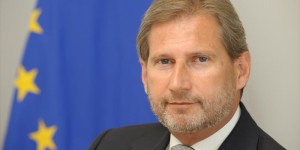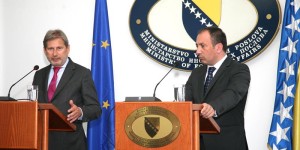Enlargement: Need for bold visions
Friends of Europe conference: ‘Western Balkans: Fast lane, slow lane’
3 December 2013, Brussels
I
have just returned from Prague where we held 16 hours of talks with the
political leaders from Bosnia and Herzegovina trying to find solutions
for the issues which are blocking this country´s progress on the
European path.
20 years ago, countries of former Yugoslavia
affected by conflict. Since then, important changes; common EU
perspective played an important role in stabilising the region. The EU's
engagement in the Balkans based on peace, values and reconciliation was
one of the main contributing factors for the award of the Nobel Peace
Prize to the EU last year.
We talk a lot about the transformative
power of enlargement. One of the lessons learnt is that we have not
only to see the bigger picture, but we also need to tackle also the
issue how it is perceived by the public. The enlargement will not be
successful if we only focus on the big picture and do not think about
the views and concerns the citizens have in this regard and how they
perceive enlargement.
Now facing tough economic and political
situation. Within the EU, there are growing concerns about taking on new
Member States – people focus on the negative aspects and overlook the
benefits. At the same time, in the enlargement countries, there is a
need to do more to deliver on reforms and meet the accession criteria.
Last year was very important in terms of visible results of enlargement:
Croatia
has completed long hard road of reforms is now the 28th EU Member
State. Shows that enlargement perspective is credible and that EU
delivers when conditions are met.
Serbia and Kosovo reached an
historic breakthrough with their agreement on normalisation of
relations. EU processes – accession negotiations for Serbia and SAA
negotiations with Kosovo – will support continued normalisation and
reforms. Excellent example of the pull of the EU and of what can be
achieved provided the political leaders show courage and vision.
Enlargement
policy does not exist in a vacuum. Copenhagen criteria and EU values
remain at its core, but it evolves, building on past experience. Lessons
of previous enlargements clearly point to importance of addressing the
fundamentals first. Crucial to demonstrate credibility and
sustainability of process. Short cuts don't help the EU or the countries
themselves. The process is more sophisticated and rigorous. Pace
depends on countries’ own merits in tackling difficult and deep reforms.
Rule of law remains at the heart of the process. New approach
to rule of law being implemented. Need reforms (judiciary, fight against
corruption and organised crime) to be deeply embedded. Implementation
is key. You need to get under your skin – and not only at the end of the
process. There is a need for track record of investigations,
prosecutions and convictions.
Rule of law also important for
economy. Economic crisis underlines need for all countries to strengthen
their economic governance. Work on economic criteria and improve
economic competiveness as early as possible.
Need to strengthen
democratic institutions and ensure inclusive democratic processes. Need
parliamentary/electoral reform, public administration reform
(depoliticisation), and stronger civil society.
Need to
strengthen fundamental rights, especially so that freedom of expression
and rights of vulnerable groups (esp. Roma and LGBTI) are respected in
practice not just in law.
Need to stimulate regional cooperation and renew efforts to overcome bilateral disputes and improve good neighbourly relations.
Focus
on economy – strengthening functioning market economy – inspired by
crisis and need and interest in WB of boosting economic performance. EU
progress is good for business, growth and further reform.
I am
more and more concerned about the growing difference between what we
negotiate with the candidate countries and what is being negotiated in
Brussel in terms of economic governance. We need to make sure that the
candidates deliver not only on the rule of law. We need to ensure that
they are as competitive as possible after they join the EU.
Political
reforms and economic dynamism were mutually reinforcing. Difficult
political reforms are easier to accomplish when the economy is in good
shape.
Therefore, we need to work on economic criteria and improve economic competiveness as early as possible.
As Commission, encouraging countries:
To
coordinate structural reforms (do more on education, research, develop
infrastructure). Competitiveness demands engagement of many ministers
and agencies.
Get public finances in order (which will pave way for budget support)
We
will be measuring and rewarding real not “tick box” reform. To achieve
this, the Commission is asking the countries to present annual
comprehensive programmes which will outline how they plan to become
functioning market economies and increase their competitiveness.
The Commission will engage in dialogue on these programmes and issue a number of country specific recommendations.
We
will provide substantial technical assistance to the countries to help
this process. We will work closely with IFIs to leverage substantial
support for investment. Important role for IFIs planned under IPA2
(launch in 2014) and the Western Balkans Investment Framework.
Looking at what is to come next:
Albania
– Prospect of candidate status has had the desired effect and
conditions have been met (three key measures; June elections; good
progress on organised crime and corruption). New government is clearly
prioritising and delivering on organised crime and corruption.
Commitment confirmed at High Level Dialogue on the Key Priorities
launched few weeks ago. Granting candidate status would be also
encouragement to continue efforts. I have been impressed by the progress
made, by inclusiveness of reforms, and opposition playing constructive
role. I am impressed by the way how the partners are tackling pour
recommendation to fight corruption and organised crime. I hope the
Member States will take that into a due consideration
The former
Yugoslav Republic of Macedonia – Concerned about domestic political
situation, tensions between government and opposition. No tangible
results on the name issue within the process under UN auspices.
Commission recommended opening of negotiations for the 5th time.
Prospects for December Council discussions (and beyond) are gloomy.
Situation
difficult in Bosnia and Herzegovina: lack of implementation of
Sejdić-Finci ruling, of EU coordination mechanism and of SAA adaptation
seriously hampering the country's progress on EU path.
Montenegro: Negotiations ongoing. Moving forward on rule of law in line with the new approach crucial.
Serbia: Date for IGC at the latest in January. Are we going to be ready in December? You bet.
Kosovo: SAA negotiations ongoing. Reform efforts key.
Conclusions:
It
is time to be bold. We see our colleagues to deal with economic and
fiscal vision. They are bold in defining the future face of the EU. The
European Parliament is also a good platform to present ideas about
political union. We need to participate in that discussions to make sure
that whatever future European Union there will be, it is
enlargement-friendly. It is about time to discuss how to make sure that
enlargement continues hand in hand with the integration allowing those
who want to go deeper, to go deeper.
Check Against Delivery



